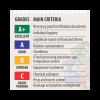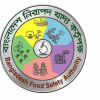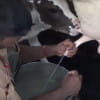Use of Chemicals in Fruits: Recent drives draw flak
Participants at a workshop organised by Bangladesh Food Safety Authority (BFSA) yesterday said it was necessary for the concerned bodies to coordinate their activities so that proper assessment on the use of chemicals in fruits was ensured.
BFSA organised the workshop to create awareness regarding the use of chemicals in fruits and its effects on human heath in the capital's Bangladesh Institute of International and Strategic Studies auditorium.
Criticising the recent drives by law enforcers where they damaged mangoes with traces of two chemicals, Ethephon and Carbide, BFSA said those were not harmful if used in limited quantities.
Speakers at the programme said Ethephon was used in many countries to ripen food and it was not banned there as the chemical had no adverse effect when used on fruits. If fruit was ripened by Ethephon before the right time then the nutrition count could be lower than usual, but it was edible and harmless.
They also said consuming mangoes ripened with carbide, a deadly ripening agent, could harm a person directly, so it was banned by the law under the Safe Food Act, 2013.
Speaking at the workshop, Chairman of BFSA Mohammad Mahfuzul Hoque said, “Formalin [naturally occurs] in limited portions in vegetables and it does not harm humans.”
He also said there was a specific machine which could identify natural formalin and adulterated formalin and if it was not used by the drive team, they would not able to detect the amount of chemicals used in the fruits.
Emphasising on the need for coordination among the concerned bodies and the BFSA, he said if fruits were found to be ripened before due time during the drives then the sellers should be subjected to punishment, but if the fruits were not harmful then destroying them would be unfortunate.
Referring to different international newspapers and reports, a member of BFSA Prof Iqbal Rouf Mamun said the use of Ethephon in the fruits was recognised universally.
In a confined chamber Ethylene gas was used to ripen food in different countries, however its gas form was not used to ripen food in Bangladesh, said Iqbal, also a faculty member of the chemistry department in Dhaka University. Many participants stressed the need for using the Ethylene gas as a safer method.
Senior Advisor (improving food safety project) of FAO, Dr Shah Monir, said that BFSA was established to ensure safe food assessment for the people of the country.
It would be a practical step if different bodies, including Bangladesh Standards and Testing Institution (BSTI), health department, district magistrates, and city corporations, coordinated with each other along with BFSA while conducting drives, he said.
He also opined that before the drives, it was important for all the concerned bodies to form a basis for assessing the amount of chemicals in fruits and to what amount their use could be allowed.
Criticising the drives by law enforcers, the General Secretary of Consumers Association of Bangladesh, Humayun Kabir Bhuiyan, said during the drives the authority used backdated methods to find whether the fruits were adulterated.
“If flies sit on a fruit then it is free of chemicals and if they don't then the fruit is adulterated by chemicals--such a backdated method is still used,” he alleged.
Deputy Commissioner (operation) of Dhaka Metropolitan Police Md Shaheed said that the drives were conducted by authorised teams which were supported by different bodies, including BSTI and the fishery department, while it was the magistrate who handed the punishment according to the law.
He said that during the drive, the authorised body should take into consideration that use of chemicals did not always make food inedible; however, fruits were eventually getting destroyed as there wasn't an accepted procedure to ensuring the correct amount of chemicals or which ones were acceptable.
Director (nutrition) of Bangladesh Agricultural Research Council Dr Monirul Islam, Assistant Director (CM) of BSTI SM Abu Sayed and Member of BFSA Mahbub Kabir were also present at the workshop among others.

 For all latest news, follow The Daily Star's Google News channel.
For all latest news, follow The Daily Star's Google News channel. 








Comments